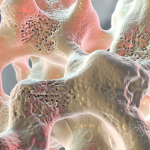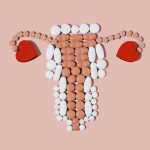Some treatments for cancer can affect the levels of sex hormones. This can cause a range of different symptoms. There are things you can do, and there are other treatments to help you cope with these symptoms.
What are sex hormones?
Hormones are natural substances made by the glands of our hormone system. They are carried around our body in our bloodstream. The main female sex hormones are oestrogen and progesterone. The main male sex hormone is testosterone.
Treatments that can affect the levels of sex hormones include:
- surgery
- chemotherapy
- radiotherapy
- hormone treatment
The effect of targeted and immunotherapy cancer drugs on sex hormone levels is not yet clear.
Surgery to remove the ovaries
The ovaries make sex hormones. When the ovaries are removed by surgery, your sex hormone levels are lowered.
Ovarian cancer
You might have both ovaries removed if you have ovarian cancer. This operation is an oophorectomy (pronounced oo-for-ek-toe-mee).
If you have had your menopause  , removing the ovaries won’t cause symptoms. But if you are pre menopausal
, removing the ovaries won’t cause symptoms. But if you are pre menopausal  removing the ovaries will make you go into an early menopause
removing the ovaries will make you go into an early menopause  . This can happen within a few days of your surgery.
. This can happen within a few days of your surgery.
For some very early stage ovarian cancers affecting one ovary, it might be possible to remove the affected ovary only. This means that the unaffected ovary is left in place. This means you will not go through the menopause.
Vaginal cancer and vulval cancer
Some types of surgery for vaginal and vulval cancer might involve removing the ovaries.
Most women who have these cancers have had their menopause. This means they won’t have hormone symptoms.
Breast cancer
Some breast cancers are hormone sensitive. This means they need oestrogen to grow. So stopping oestrogen production can slow down or stop cancer cell growth.
If you are pre menopausal you might take medicines to switch off your ovaries. Or you might choose to have your ovaries removed. With either, you will have a sudden menopause and have symptoms.
If you have medicines to switch off your ovaries they should start working again when you stop taking the medicine. But, if you’re close to the age at which your menopause would naturally start, your periods might not start again.
Symptoms of the menopause include:
- hot flushes
- night sweats
- anxiety, low mood and mood changes
- feeling very tired (fatigue) and poor sleep
- problems with thinking, concentration and memory – sometimes called brain fog
- loss of interest in sex
- joint pains and muscle aches
- thinning and weakening of the bones
- headaches and worsening migraines
- itching, irritation or dryness of your vulva or vagina
- vaginal pain or discomfort during sex
- vaginal bleeding after sex
- urinary problems such as needing to wee urgently, infection or incontinence
Surgery to remove the testes
The testes (testicles) make testosterone. Surgery to remove them lowers your testosterone levels. The operation is called an orchidectomy (pronounced or-kid-ek-toe-mee).
This is a treatment for testicular cancer and sometimes prostate cancer.
Testicular cancer
For most men, testicular cancer only affects one testicle. The remaining testicle usually makes more testosterone. So, removing one testicle doesn’t have much effect on testosterone levels.
If you develop cancer in both testicles you need to have both removed. You would then need testosterone replacement treatment. This is to help prevent symptoms related to hormone loss.
Prostate cancer
In prostate cancer, stopping testosterone production can slow down or stop cancer cell growth. So one treatment is to have your testicles removed. But most men have medicines to switch off testosterone production instead.
Symptoms of low testosterone levels
The symptoms of low testosterone levels include:
- hot flushes
- changes in memory and concentration
- changes in mood
- changes in weight and muscle mass
- erection problems (erectile dysfunction)
- breast swelling and tenderness
- a risk of bone thinning that can increase the risk of osteoporosis
- tiredness
- loss of interest in sex
Chemotherapy
Chemotherapy is the use of anti cancer drugs (cytotoxics) to destroy cancer cells.
The effects on women
If you haven’t been through the menopause, chemotherapy can stop your ovaries working normally. This depends on:
- the type and dose of chemotherapy drugs you have
- your age
Your periods might stop temporarily. But if you are close to the age when you would naturally have your menopause, the chemotherapy might stop your periods permanently.
Young women treated with chemotherapy might have the menopause earlier. Your doctor will tell you if there is a risk of this happening. You might need to think about planning a family at a younger age because of the risk of early menopause.
There are options to preserve fertility for those who want to have children. But these are not suitable for everyone. Your doctor will talk to you about this.
The effects on men
Not all chemotherapy drugs affect testosterone levels. But some can affect the production of testosterone. This can cause symptoms such as a reduced sex drive and tiredness.
Doctors are not clear on how chemotherapy affects testosterone levels. It might depend on:
- the type of chemotherapy you have
- how much chemotherapy you have
- your age at the time of your treatment
Researchers have looked into sexual function after treatment for lymphoma. They found that men who had treatment for lymphoma had lower sexual function.
The researchers were unsure if this was due to lower testosterone levels. Or whether this was due to other factors such as:
- increasing age
- emotional distress
- poorer physical health
We need more research to find out how chemotherapy affects testosterone.
Radiotherapy to the pelvic area
Radiotherapy uses high energy waves similar to x-rays to kill cancer cells.
The pelvis is the area between your hip bones.
In females, the pelvis contains the ovaries and womb. It also contains the bladder and part of the bowel. In males, the pelvis includes the testes and the prostate, as well as the bladder and part of the bowel.
Radiotherapy to this area of the body can damage the surrounding tissue. For example, If the ovaries or testes are in the treatment area it can affect sex hormone levels.
You might have pelvic radiotherapy for cancers of the:
- rectum
- anus
- bladder
- womb
- cervix
- prostate gland
Whenever possible your radiotherapy specialist will plan treatment to reduce the risk of lowered sex hormone levels.
Hormone therapy
Hormone therapy is a treatment for:
- prostate cancer
- breast cancer in women and men
- womb cancer
Hormone treatments can work in one of two ways:
- stopping the body making the hormone
- preventing the hormone from reaching receptors in the cancer cell
Whichever way the hormone therapy works, it can cause hormone symptoms.
Targeted and immunotherapy cancer drugs
Targeted cancer drugs work by targeting the differences in cancer cells that help them to grow and survive. Immunotherapy uses our immune system to attack the cancer.
These treatments are quite new and the effect on sex hormone levels is not yet clear. Researchers are looking at this. For example, one study looked at testosterone levels in men having immunotherapy for malignant melanoma. It showed that some had lower levels of testosterone. But we need more research to understand why this happens.



